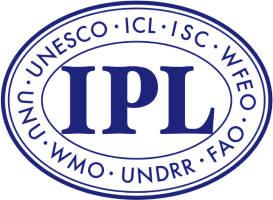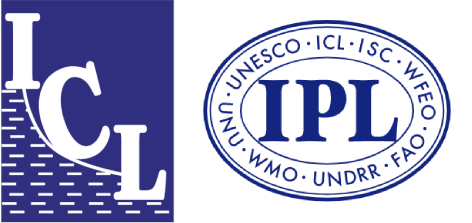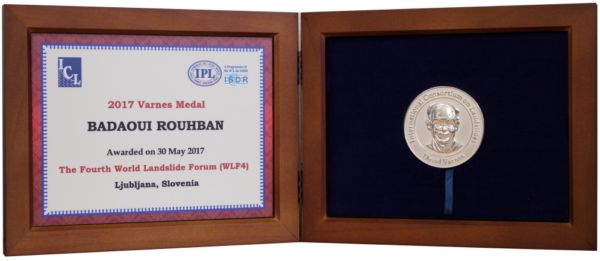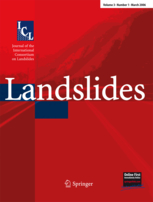Varnes Medal
The Varnes Medal is the highest award provided by the International Consortium on Landslides; it recognizes professional excellence in landslide research. Nominees for the Varnes Medal must meet at least two of the following criteria:
- Professional excellence in landslide research
- Professional excellence in landslide disaster risk reduction (new criteria)
- Significant contribution to the development of ICL and IPL (new criteria)
- Significant contribution to public education regarding landslide hazards
- International recognition for a professional career involving landslides
- Influential landslide research or development of methods or techniques
- Teacher of students who work on landslide issues
Photo of the Varnes Medal awarded to Badaoui Rouhban in 2017
Varnes medal is made of pure silver commemorating David Varnes (US. Geological Survey).
The past recipients of Varnes Medal are:
- Robert Schuster (US Geological Survey, USA) , 2nd Session of BOR/ICL at Simon Fraser University, Vancouver, Canada in October 2003
- John Hutchinson (Imperial Colleague, UK), 3rd Sesson of BOR/ICL at Druzba Hotel, Bratislava, Slovakia in October 2004
- Masami Fukuoka (University of Tokyo, Japan), 4th Session of BOR/ICL at Keck Center of the National Academy of Science, Washington D.C., USA in October 2005
- Norbert R. Morgenstern (University of Alberta, Canada), 5th Session of BOR/ICL at Bonvin Building, UNESCO Headquarters in Paris, France in November 2006
- Edward Derybyshire (University of Leicester, UK), 6th Session of BOR/ICL at Bonvin Building, UNESCO Headquarters in Paris, France in November 2007
- David Cruden (University of Alberta, Canada), 7th Session of BOR/ICL at the United Nations University, Tokyo, Japan in November 2008
- Zaiguan Lin (Leader of China-Japan Joint research on Landslide hazard assessment at Cultural heritage sites in Xi’an. It developed to IGCP-425 “Landslide Hazard Assessment and Cultural
- Heritage” which was further develop to ICL and IPL), 9th Session of BOR/ICL at Bonvin Building, UNESCO Headquarters, Paris, France in November 2010
- Rajendra Kumar Bhandari (Central Building Research Institute, India), 11th session of BOR/ICL, at Bonvin Building, UNESCO Headquarters, Paris, France in November 2012
- Luciano Picarelli (Seconda Università di Napoli), 13th session of BOR/ICL, at National Convention Center, Beijing, China, in June 2014
- Oldrich Hungr (University of British Columbia, Vancouver, Canada), at 14th BOR/ICL, Tohoku Gakuin University, Sendai, Japan, in March 2015
- Jordi Corominas, (Technical University of Catalonia-UPC, Spain), 15th BOR/ICL, Disaster Prevention Research Institute, Kyoto University, Kyoto, Japan, in March 2016
- Badaoui Rouhban (Former Director, Section for Disaster Reduction, UNESCO), 16th Session of BOR/ICL, UNESCO Headquarters, Paris, France in November 2016
- Salvano Briceno (Former Director, International Strategy for Disaster Reduction (UNISDR), 17th Session of BOR/ICL, UNESCO Headquarters, Paris, France in December 2017
- Salvano Briceno (Former Director, International Strategy for Disaster Reduction (UNISDR), 17th Session of BOR/ICL, UNESCO Headquarters, Paris, France in December 2017
- Hans van Ginkel (Former Rector of the United Nations University, Tokyo, Japan). 18th Session of BOR/ICL, DPRI, Kyoto University, Kyoto, Japan in December 2018
- Paolo Canuti (Former President of the ICL, University of Florence), 20th Session of BOR/ICL, online/Virtual Conference, Kyoto, Japan in November 2020.
- Paola Reichenbach (Director of Research, IRPI, Italian National Research Council, Italy), 2021 ICL-IPL-KLC2020 Hybrid Conference, Kyoto, Japan, in November 2021.
- Charles Wang Wai NG (Professor of the Department of Civil and Environmental Engineering, Hong Kong University of Science and Technology (HKUST), HKSAR, China), ICL 20th Anniversary and 2022 ICL-KLC Conference, Kyoto, Japan, in November 2022
- Edward Bromhead (Professor of School of Civil Engineering and Construction, Kingston University, UK). ICL 20th Anniversary and 2022 ICL-KLC Conference, Kyoto, Japan, in November 2022
- Irasema Alcantara-Ayala (Full professor, Institute of Geography, National Autonomous University of Mexico (UNAM)). 2023 BOR/ICL and GPC/IPL-KLC Meetings, Florence, Italy, in November 2023.
- Fausto Guzzetti, Research Director at the Research Institute for Geo-hydrological Protection (CNRIRPI). 2024 BOR/ICL and GPC/IPL-KLC Meetings, Kyoto, Japan, in November 2024.
Best Paper Award
This award is given annually for the best paper published in Landslides: Journal of International Consortium on Landslides for the year beginning with the calendar year 2004 (Vol. 1).
How to select:
- Judging for the award will be by members of the Best Paper Award Subcommittee.
- Ranking of papers by Subcommittee members will be based on the following numerical grading system:
Scientific and technical quality: 50%
Impact on the profession and society: 30%
Quality of figures and tables: 20% - Based on the above rating system, subcommittee members should rank the top five papers for the year into a five-paper “short list” with the member’s choice for the best paper being number 1, the second best paper being number 2, etc. These lists should be submitted by e-mail to the Chairman of the Subcommittee.
- The Chairman will apply numerical scores to each short list as follows: number 1 will receive 5 points; number 2 will receive 4 points, number 3 will receive 3 points, etc.
- The Chairman will total the points for all of the short lists. The paper with the highest point total will receive the Best Paper Award.
- In case of a tie, the Chairman will call for a “tiebreaker” vote.
- Note for the short lists: A Subcommittee member will not be allowed to recommend a paper for which he/she is the author or coauthor.
The past recipients of the Best Paper Award are:
- Claudio Margottini (2004) Instability and geotechnical problems of the Buddha niches and surrounding cliff in Bamiyan Valley, central Afghanistan. Vol.1, No.1 :41-51
- Rex L. Baum, Jeffery A. Coe, Jonathan W. Godt, Edwin L. Harp, Mark E. Reid, William Z. Savage, William H. Schulz, Dianne L. Brien Alan F. Chleborad, Jonathan P. McKenna and John A. Michael, (2005) Regional landslide-hazard assessment for Seattle, Washington, USA. Vol.2, No.4:266-279
- Farrokh Nadim, Oddvar Kjekstad, Pascal Peduzzi, Christian Herold, and Christian Jaedicke (2006) Global landslide and avalanche hotspots. Vol. 3, No. 2:159-173
- Didier Leynaud, Nabil Sultan, and Jürgen Mienert (2007) The role of sedimentation rate and permeability in the slope stability of the formerly glaciated Norwegian continental margin: the Storegga slide model. Vol.4, No. 4:297-309
- Adam B. Prochaska, Paul M. Santi, Jerry D. Higgins, and Susan H. Cannon (2008) A study of methods to estimate debris flow velocity. Vol.5, No.4:413-444
- K. Lundström, R. Larsson, T. Dahlin (2009) Mapping of quick clay formations using geotechnical and geophysical methods. Vol.6, No.1:1-15
- Christopher I. Massey, Vernon Manville, Graham H. Hancox, Harry J. Keys, Colin Lawrence, Mauri McSaveney (2010) Out-burst flood (lahar) triggered by retrogressive landsliding, 18 March 2007 at Mt Ruapehu,New Zealand—a successful early warning. Vol.7, No. 3: 303-315
- M.A. Brideau, A. Pedrazzini, D. Stead, C. Froese, M. Jaboyedoff and D. van Zeyl (2011): Three-dimensional slope stability analysis of South Peak, Crowsnest Pass, Alberta, Canada, Vol 8, No 2:139-158
- N.M. Pinyol, E.E. Alonso, J. Corominas and J. Moya (2012): Canelles landslide: modelling rapid drawdown and fast potential sliding (Vol.9, No.1:33-51),
- R. Sosio, G.B. Crosta and O. Hungr (2012): Numerical modeling of debris avalanche propagation from collapse of volcanic edifices (Vol.9, No.3:315-334)
- D.M. Staley, J.W. Kean, S.H. Cannon, K.M. Schmidt, and J.L. Laber (2013: Objective definition of rainfall intensity – duration thresholds for the initiation of post-fire debris flows in southern California (Vol.10, No 5: 547–562)
- O. Hunger, S. Leroueil, L. Picarelli (2014) The Varnes classification of landslide types, an update (Vol.11, No.2, 167-194)
- D. Huang, D. Cen, G. Ma and R. Huang (2015) Step-path failure of rock slopes with intermittent joints (Vol.12, No.5, 911–926)
- S. Yavari-Ramshe and B. Ataie-Ashtiani (2016) Numerical modeling of subaerial and submarine landslide-generated tsunami waves – recent advances and future challenges (Vol.13, No. 6, 1325–1368)
- R. Ruiz-Carulla, J. Corominas and O. Mavrouli (2017) A fractal fragmentation model for rockfalls (Vol.14, No.3, 875–889)
- P. Frattini, G.B. Crosta, M. Rossini, J. Allievi (2018) Activity and kinematic behaviour of deep-seated landslides from PS-InSAR displacement rate measurements (Vol.15, No.6, 1053-1070)
- G.D. Zhou, S. Li, D. Song, C.E. Choi, X. Chen (2019) Depositional mechanisms and morphology of debris flow: physical modeling (Vol.16, No. 2, 315-332)
- A. Dufresne, G.J. Walken, C. Hibert, E.K. Bassette-Kirton, J.A. Coe, M. Geertsema and G. Ekstrom (2019) The 2016 Lamplugh rock avalanche, Alaska: deposit structures and emplacement dynamics (Vol.16, No, 12, 2301-2319)
- A. Dufresne and M. Geertsema (2020) Rock slide–debris avalanches: flow transformation and hummock formation, examples from British Columbia, (Vol.17, No.1, 15-32)
- Mark E. Reid, Jonathan W. Godt, Richard G. LaHusen, Stephen L. Slaughter, Thomas C.Badger, Brian D. Collins, William H. Schulz , Rex L. Baum, Jeffrey A. Coe, Edwin L. Harp, Kevin M. Schmidt, Richard M. Iverson, Joel B. Smith, Ralph A. Haugerud, and David L. George (2021) When hazard avoidance is not an option: lessons learned from monitoring the postdisaster Oso landslide, USA, (Vol.18, No.9, 2993–3009)
- Mathilde Desrues, Jean‑Philippe Malet, Ombeline Brenguier, Aurore Carrier, Alexandre Mathy, Lionel Lorier (2022) Landslide kinematics inferred from in situ measurements: the Cliets rock-slide (Savoie, French Alps). Landslides Vol.19(1):19–34
- Jian Guo, Yifei Cui, Wenjie Xu, Yanzhou Yin, Yao Li, Wen Jin (2022) Numerical investigation of the landslide-debris flow transformation process considering topographic and entrainment effects: a case study. Landslides Vol.19(4) :773–788
- Marcel Hurlimann, Zizheng Guo, Carol Puig‑Polo, Vicente Medina (2022) Impacts of future climate and land cover changes on landslide susceptibility: regional scale modelling in the Val d’Aran region (Pyrenees, Spain), Landslides Vol.19 (1) :99–118
IPL Award for Success
The IPL award was given for three success projects implemented within IPL at each World Landslide Forum by evaluating the previous 3 year activities. The achievement of IPL projects is much affected by the finances and the infrastructure of the developed or developing country. The aim of the IPL Award for Success is not to select the Best IPL project, but to select the Successful IPL projects relative to the circumstances of the group.
- Awards for the winner(s) are 3000 USD and Certificate
- Judging for the award will be by members of the IPL Award committee
- IPL Award Committee: Chairperson, 2 members and a secretary
- Evaluation of projects will be based on the different items for types of projects
The past recipients of the IPL Award for Success are:
The Second World Landslide Forum at FAO Headquarters, Rome, October 2011.
- (1) Lynn Highland: U.S. Geological Survey, and Peter Bobrowsky: Geological Survey of Canada (Publication)
IPL 106 Best Practice handbook for landslide hazard mitigation (2002-2007) - (2) Farrokh Nadim and Bjørn Kalsnes: International Centre for Geohazards, Norway (Research)
IPL 102 Assessment of global high-risk landslide disaster hotspots (2002-2004)
IPL 144 Changing pattern of landslide risk and strategies for its management (2009-present) - (3) Dwikorita Karnawati and Faisal Fathani: Universitas Gadjah Mada, Indonesia (Capacity Building)
IPL 158 Development of Community-based Landslide Early Warning System (2009-present)
IPL 159 Development of Education Program for Sustainable Development in Landslide Vulnerable Area through Student Community Service (2009-present)
The Third World Landslide Forum at China National Convention Center, Beijing, China, 2014.
- (1) Wei Shan: Research Center of Cold Regions Landslide, China
IPL-132 Research on vegetation protection system for highway soil slope in seasonal frozen regions (2008-present)
IPL-167 The effect of freezing-thawing on the stability of ancient landslide of North-Black highway (2009-present) - (2) Ogbonnaya Igwe: Department of Geology, University of Nigeria, Nsukka, Nigeria
IPL-150 Capacity building and the impact of climate-driven changes on regional landslide distribution, frequency and scale of catastrophe (2010 – present)
IPL-183 Landslides in West Africa: impacts, mechanism and management (2012-present)
The Fourth World Landslide Forum at the Cultural and Congress Centre in Ljubljana, Slovenia, 2017.
- 1) Claudio Margottini: ISPRA, Dpt. Geological Survey of Italy
IPL-106- 1 Landslide museum in Civita di Bagnoregio (2006/2008- 2012) (published in Landslides, Vol.14 (1) in 2017)
IPL-186 Rock-fall hazard assessment and monitoring in the archaelogical site of Petra, Jordan (2013 -)
IPL-217 PROTHEGO – PROTection of European Cultural HEritage from GeO – Hazards (Daniele Spizzichino/ Claudio Margottini, 2017-)
WLF4 Forum Lecture : “Rupestrian world heritage sites: Instability investigation and sustainable mitigation” by Caudio Margottini, Peter Bobrowsky, Giovanni Gigli, Heinz Ruther, Daniele
Spizzichino and Jan Vlcko (published in Vol.1 ISDR-ICL Sendai Partnerships of WLF4) including one of IPL initial projects. IPL-C101-3 “The geomorphological instability of the Buddha niches and surrounding cliff in Bamiyan valley (Central Afganistan)” (2002-2015) - 2) A A Virajh Dias: Central Engineering Consultancy Bureau (CECB), Sri Lanka
Model Policy Frameworks, Standards and Guidelines on Landslide Disaster Reduction (WCoE 2014-2017: Leader). Published in Vol.1 of WLF4.
IPL-155 (Leader) Determination of soil parameters of subsurface to be used in slope stability analysis in two different precipitation zones of Sri Lanka.
IPL-199 (core member); The Effect of Root Systems in Natural Slope Erosion Protection in the Hill Country of Sri Lanka
IPL-200 (core member): An Assessment of the Rock fall Susceptibility Based on Cut Slopes Adjacent to Highways and Railways
The Fifth World Landslide Forum at the Kyoto International Conference Center in Kyoto, Japan, 2021.
- Irasema Alcántara‐Ayala: Natural hazards and Disaster risk at the National Autonomous University of Mexico.
IPL-208 (Leader): Landslide disaster risk communication in mountain areas (Published in the ISDR-ICL Landslide Interactive Teaching Tools, 2017 and in Landslides, Vol.18 (1) in 2021)
WCoE 2017-2020 (Leader): Landslide integrated research for disaster risk reduction.
WCoE 2020-2023 (Leader): Integrated research on landslide disaster risk.
IPL-KLC Award for Success
Kyoto 2020 Commitment for Global Promotion of Understanding and Reducing Landslide Disaster Risk (Kyoto Landslide Commitment 2020: KLC2020).
KLC2020 was signed by 90 global organizations in 2020 and another 16 organizations signed it at the Sixth World Landslide Forum in 2023. In order to promote the KLC2020, ICL open access book series “Progress in Landslide Research and Technology” was launched in 2022.
The IPL Award for Success has been developed to the IPL-KLC Award for Success from 2023.
The first recipient of the IPL-KLC Award for Success is:
The Sixth World Landslide Forum at the Palazzo degli Affari, in Florence, Italy, 2023.
- Maneesha Vinodini Ramesh: Amrita Vishwa Vidyapeetham, Amritapuri, India
She is the first and the corresponding author of the Landslide Early Warning Systems: Requirements and Solutions for Disaster Risk Reduction—India. Progress in Landslide Science and Technology, Volume 1, Issue 2, pp259-286, in the Category of IPL Projects, World Centres of Excellence on Landslide Risk Reduction and Kyoto Landslide Commitment 2020.
Oldrich Hungr Award
The award recognizes the contribution of Oldrich Hungr to landslide research and science. The ICL and IPL membership believes that an appropriate award in his honor would be devoted to supporting young scientists in their research focusing in landslides. The conditions of the award are:
1. It is entitled the “Oldrich Hungr award”;
2. It is given every year to a young scientist (35 years or younger) for his/her contribution to the field of landslide;
3. Requires the winner to give a lecture at the next WLF that highlights his/her landslide research contributions;
4. The winning candidate receives a plaque and an honorarium of $500 as well as free registration to next WLF;
5. Nominations will be accepted by the IPL/ICL Secretariat proposed by any ICL member in good standing up to 3 months prior to the annual ICL BOR; the exact date will be advertised by the IPL/ICL Secretariat;
6. Winners are notified approximately 1 month after the BOR.
The past recipients of the Oldrich Hungr Award are:
- Beena Ajmera (North Dakota State University, USA), 20th Session of BOR/ICL, online/Virtual Conference, Kyoto, Japan in November 2020.
- Clarence Choi (Department of Civil Engineering, the University of Hong Kong, HKSAR, China), ICL 20th Anniversary and 2022 ICL-KLC Conference, Kyoto, Japan, in November 2022.
- Tommaso Carla (University of Florence, Italy), 2023 BOR/ICL and GPC/IPL-KLC Meetings, Florence, Italy, in November 2023.
- Luqi Wang (Chongqing University, China), 2024 BOR/ICL and GPC/IPL-KLC Meetings, Kyoto, Japan, in November 2024.
Hiroshi Fukuoka IPL Award
This award is named in honor of the late Professor Hiroshi Fukuoka, a Japanese landslide expert with global exposure to landslide risk, valuable experience in technical cooperation with developing countries, and a founding member and supporter of both the International Consortium on Landslides (ICL) and the International Programme on Landslides (IPL).
- It is entitled the “Hiroshi Fukuoka IPL Award”
- It is given every 3 years coinciding with the World Landslide Forum (WLF) to an individual or group of individuals whose work deals with landslide risk reduction in a developing country or countries.
- It consists of a $1500 USD travel grant to use specifically towards participation in the next WLF conference.
- It requires the winning individual/individuals to contribute a technical presentation at the WLF that highlights their landslide research contributions that benefit an area in a developing country.
- Nominations proposed by any ICL member in good standing up to 6 months prior to the forthcoming WLF will be accepted by the IPL/ICL Secretariat; the IPL/ICL Secretariat announces the exact date.
- (Winners, Beneficiaries) are notified approximately 3 months prior to the WLF.
The past recipients of the Hiroshi Fukuoka IPL Award Award are:
- Claudio Margottini (Scientific and Technological Attaché Embassy of Italy in Cairo (Egypt) , 20th Session of BOR/ICL, online/Virtual Conference, Kyoto, Japan in November 2020.
- Vít Vilímek (Charles University, Faculty of Science, Department of Physical Geography and Geoecology, Czech Republic) and Jan Klimeš (Institute of Rock Structure and Mechanics, Academy of Sciences of the Czech Republic, Department of Engineering Geology), 2023 BOR/ICL and GPC/IPL-KLC Meetings, Florence, Italy, in November 2023.
Special Award for Appreciation
The past recipients of Special awards for appreciation are:
- Wolfgang Eder (Director, Division of Earth Sciences of UNESCO) for his outstanding contribution to the establishment of ICL at 4th Session of BOR/ICL in Washington D.C., USA
- Badaoui Rouhban (Director, Section for Disaster Reduction at UNESCO) for his outstanding contribution to ICL and IPL activities since ICL foundation 2002 at ICL 10th Anniversary Conference, Kyoto, Japan in January 2012
- Salvano Briceno for his outstanding contribution to ICL and IPL activities for 2002-2011 as the Director of UNISDR at ICL 10th Anniversary Conference, Kyoto, Japan in January 2012
Distinguished Student Awards
This award is given to the distinguished student presented in the World Landslide Forums. Students are encouraged to present their landslide research in the form of a regular Forum paper in the student session. The first author must be a student and the paper must be presented orally by the student, the number of paper’s co-authors is limited to three (i.e. since the student is the first author, 4 in total). Eligible papers will be evaluated by a panel of participating professors. Distinguished student awards (2–3) will be made to the first authors of the best presented papers judged under the different research and educational conditions of developed and developing countries. The ICL President will present the distinguished student awards to the recipients in the closing plenary session of the WLFs.
The past recipients of the Distinguished Student Awards are:
The Third World Landslide Forum at China National Convention Center, Beijing, China, 2014:
- H Setiawan (2014) The simulations of a deep large-scale landslide near Aratozawa dam using a 3.0 MPa undrained dynamic loading ring shear apparatus.
The Fourth World Landslide Forum at the Cultural and Congress Centre in Ljubljana, Slovenia, 2017:
- T Hemalatha (2017) Adaptive Learning Techniques for Landslide Forecasting and the Validation in a Real World Deployment
- Andreas Schimmel (2017) Automatic detection of sediment-related disasters based on seismic and infrasound signals
Awards for ICL World Report on Landslides
The IPL World Reports on Landslides (WRL) database is created as a cooperation platform for sharing landslide case studies and the best practice in the global landslide community. ICL and IPL wish to promote and publish global landslide information using the ICL/IPL network for the ISDR-ICL Sendai Partnership 2015-2025. To advertise WRL and promote the contribution of reports two awards have been established in 2016:
- Best Report Award
- Reporter of the year
How to select:
1. Best Report Award
The quality committee is composed of 5-6 expert evaluators. The required single evaluation was based on three items:
a. Rating of LCI (Landslide Case identifier)
In the counting, its weight is 30% and a score from 1 to 7 was assigned. For the final score this value was multiplied by 10. Namely, LCI of 7 was evaluated to be 70 points.
b. Scientific and Technical Quality
In the counting, its weight is 40% and a score from 0 to 100 was assigned.
c. Impact on the profession and society
In the counting, its weight is 30% and a score from 0 to 100 was assigned.
Evaluation points of each Landslide Case identifier were calculated according to the following formula: LCI = (R x 0.3 x 10) + (S x 0.4) + (I x 0.3)
2. Reporter of the year
Each reporter (one report is submitted by one or two reporters. All reporters are counted in the same way independent of the order of reporter) is evaluated by the total ICL point for the year. It is automatically calculated from the report by summing up ICL points for all of his/her report submitted.
The first recipients of the ICL World Report on Landslides Awards in 2016 are:
- 2016 Best Report Award: 1792 Unzen Landslide and Tsunami Disaster (JPN1611131539)
- Reporter of the year 2016: Dr. Khang Dang, International Consortium on Landslides
Kyoto 2020 Commitment Award
The ICL-KLC 2020 created the following two awards. (Preface: ICL 20th anniversary and 2022 ICL-KLC conference. Vol. 20, No. 3, https://link.springer.com/article/10.1007/s10346-022-02011-5). Authors of Vol. 1-Vol. 3 of the Open Access Book Series “Progress in Landslide Research and Technology” are candidates for both awards.
A: ICL Book Article Award
- Award is a free Book Processing Charge (BPC) for 20 pages.
- The effective period for a book article submission is one year after the decision of the award.
- The number of annual awards is 1-3 in different article categories.
- Award candidate nomination Committee members (around 10) is from EIC members (5) of OCS-web and a few editors (1-3), who read almost all the articles.
- Nomination of Award (2-3) is voted by the editors of P-LRT who attend the periodical (around 2-4 times for one issue) editorial meeting of the Book.
The past recipients of ICL Book Article Award are:
- Damiano Vacha, Giuseppe Mandrone, Donato Morresi, Matteo Garbarino (2022) Mapping Post-fire Monthly Erosion Rates at the Catchment Scale Using Empirical Models Implemented in GIS. A Case Study in Northern Italy, Volume 1 Issue 1 :99–112
- Steven Moncayo, Guillermo Ávila (2022) Landslide Travel Distances in Colombia from National Landslide Database Analysis, Volume 1 Issue 1 :315–325
- Stefano Luigi Gariano, Massimo Melillo, Maria Teresa Brunetti, Sumit Kumar, Rajkumar Mathiyalagan, Silvia Peruccacci (2022) Challenges in Defining Frequentist Rainfall Thresholds to Be Implemented in a Landslide Early Warning System in India, Volume 1 Issue 1 :409–416
- Mary Antonette A. Beroya-Eitner, May Celine T. M. Vicente, Julie Mae B. Dado, Marion Roel S. Dimain, Joel T. Maquiling, Faye Abigail T. Cruz (2023) Climate Change as Modifier of Landslide Susceptibility: Case Study in Davao Oriental, Philippines, Volume 2 Issue 2 :247–257
B: IPL-KLC Award for Success
- Award is 3,000 USD in cash.
- The number of awards for each World Landslide Forum is 1-3 in different article categories (similar to the previous IPL Award for Success).
- Candidates are authors of ICL open access book series (prerequisite condition) and Journal “Landslides” to have reported IPL-KLC activities.
- The first nomination is around 10 candidates from EIC members (5) of P-LRT and the screening editors of Journal Landslides who monthly read submitted articles.
- The approval is by the IPL-KLC Global Promotion Committee.
The recipients of IPL-KLC Award for Success are listed after IPL Award for Success.





